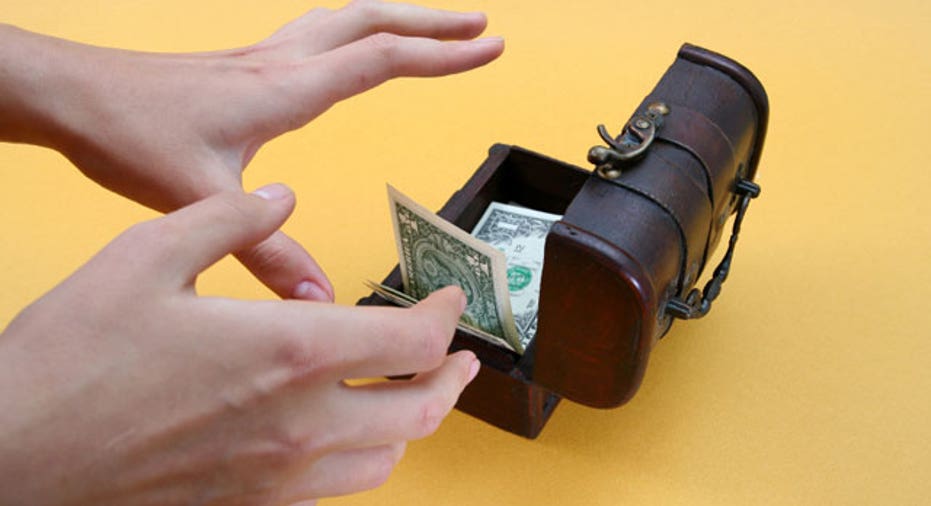How Big Should Your Emergency Fund Be?

Financial experts agree everyone needs an emergency fund, a savings account with readily accessible cash to be prepared for any contingency. The question is: How much should you keep in a rainy-day fund?
With more than 5.5 million Americans unemployed for 27 weeks or longer, according to the Bureau of Labor Statistics, the rule of thumb of three to six months' worth of expenses may no longer apply.
"A lot of experts now recommend that everyone keep nine months to one year of income in an emergency account in case of job loss," says Gail Cunningham, spokeswoman for the National Foundation for Credit Counseling in Washington, D.C. "People are often out of work now for as long as nine months, and if they don't have savings, they live on credit. So when they replace their job, they are behind because now they have debt to repay."
Cunningham says the important message for all consumers is that "you can't afford not to save."
And according to Bankrate's February Financial Security Index, just more than half, or 54%, of Americans said they have more money in emergency savings than in credit card debt. One in 4 Americans has more credit card debt than emergency savings, up a bit from 23% last year.
Cunningham recommends starting by saving $100 per month or 10% from each paycheck, so you have at least something in a savings account or checking account at the end of the year.
Scott Cramer, president of Cramer & Rauchegger Inc., a financial planning firm in Maitland, Fla., recommends having an emergency fund of three to nine months' worth of expenses, depending on individual circumstances.
Don't Underestimate
"It's a common mistake to underestimate your expenses or to just think about fixed expenses such as a mortgage," Cramer says. "I suggest people look at what they are spending on everything, including gas, food and child care, then estimate how much they will need."
Cramer says families with kids and one income need the maximum emergency fund, while retirees who face an emergency but have a pension, Social Security and low expenses may need as little as three months' worth in an accessible fund.
The factors that impact the size of your rainy-day fund include your living expenses, whether you have one or two incomes, and whether you have income from other sources such as investment properties or other income-producing assets.
"If you have two incomes and are good at budgeting, not spending every dollar that comes in, you might be OK with a smaller emergency fund," Cramer says.
After years of a weak economy, many consumers are worried about job security.
"Most people still feel uncertain about the economy. People who are self-employed may feel they have job security, but they actually need to have more than six months' of living expenses on hand because they have business expenses in addition to living expenses," says Larry Rosenthal, president of Financial Planning Services in Manassas, Va.
Where to Keep Your Cash
Cunningham recommends separating your savings into several accounts so you can more easily track your goals. One could be a rainy-day fund for small emergencies such as unexpected car or home repair bills. Others could be vacation funds, down-payment funds, or catastrophe funds for things such as job loss or a major illness.
"I recommend looking for a credit union for these funds, because they are federally insured and therefore safe," Cunningham says. "In addition, credit unions often offer checking accounts that pay higher interest rates than savings accounts or money market accounts as long as you meet certain criteria such as using a debit card, online banking and direct deposit."
While earning interest is an extra incentive when saving, most bank accounts are paying interest of 1% or less.
"If you need $5,000 per month to live on, that's $30,000 you'll need to have for a six-month emergency fund," Rosenthal says. "That may be too much money to put aside someplace that's earning as little interest as you do in a savings account." One option would be to put four months' savings in a conservative bond fund while keeping two months' in a liquid savings account or money market account.
Cramer says his big concern with investing money designated for emergencies in the stock market is the possibility of losing it.
"One option for people with equity in their home is to take out a home equity line of credit," Cramer says. "If you take out a line of credit for $100,000 and then invest $80,000 in the stock market, you can use the home equity line of credit if an emergency hits. Then, when the market is better, liquidate your investment and pay off the loan."
Another option is laddering certificates of deposit so they mature at different times, which adds a measure of liquidity to the money in those CD accounts. Even if you must liquidate a CD early, Cramer says the penalty is typically three to six months' of interest earnings.
"It may be worth taking the risk of the penalty you would incur in an emergency if you can earn a better interest rate with a CD," Cramer says.
Cramer also suggests searching for a money market account or savings account with the highest interest rate. While it may be low, it's better than losing money in the stock market.
"Everyone needs some amount of liquid cash in case something happens," Cramer says.



















